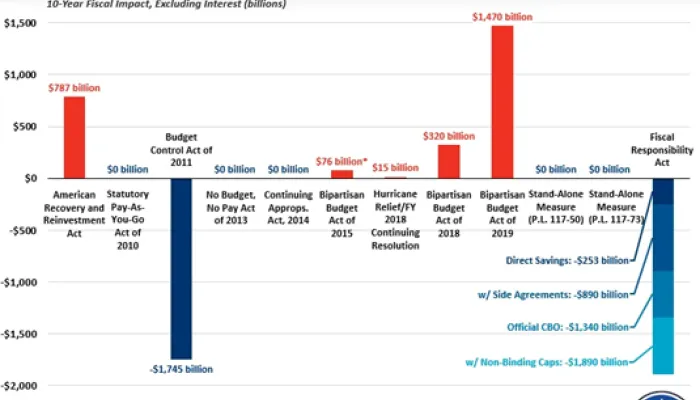Policymakers Must Avoid A Budget Busting Summer
For Immediate Release
Congress returns from the July 4 recess in the midst of negotiating three major spending packages: a bipartisan infrastructure bill, a reconciliation package focused on the remainder of the President’s agenda, and appropriations bills to fund the core functions of government. These three negotiations are happening before Congress has passed a budget, despite the fact they could lead to trillions of dollars in new spending and massive amounts of new borrowing.
The following is a statement from Maya MacGuineas, president of the Committee for a Responsible Federal Budget:
It’s hard to believe our leaders are considering spending trillions of additional dollars and don’t even have a budget. It feels like they’re driving 150 miles an hour in the middle of the night with no map or plan for where they’re going.
We are very encouraged that Democrats and Republicans have come together on a reasonable infrastructure package and a commitment to pay for it – an important goal given the nation’s swelling debt levels. The bipartisan nature of the proposal illustrates good governance and a more durable policymaking process, and it rightly focuses on investments at a time when our budget is too slanted toward consumption. We are also pleased to see them endorse common-sense pay-fors like reducing the tax gap.
But we are concerned that a lot of their numbers don’t seem to add up. The plan appears to count offsets from policies already in effect, credit savings from proposals that will actually cost the federal government money, and dramatically overstate potential reductions in fraud and abuse. Policymakers should work to improve the offsets in the proposal to ensure they meet their goal of passing a fully paid-for infrastructure package.
As for the larger reconciliation package, the spending of an additional $3 trillion, $4 trillion, or even $6 trillion – without having seen enough credible revenue increases or spending cuts to pay for it – is deeply concerning. With debt on track to reach a new record and the economy showing signs of recovery, any large-scale investments must not add to the debt and reconciliation instructions should add to zero. It was wrong to jam through deficit-financed tax cuts via reconciliation, and it would be wrong to deficit-finance spending priorities.
Meanwhile, appropriators seem to be taking as a given the President’s call for an 8 percent discretionary spending boost. Never mind that we’ve already boosted the discretionary budget by more than 18 percent over the past four years; politicians only seem to care about how much goes to defense versus nondefense.
Taking a step back, all of this is happening outside the context of a real budget resolution. Budgets are supposed to provide a holistic approach for allocating and financing scarce federal dollars. Yet halfway through the year, neither the House or Senate Budget Committee has even begun to mark up a budget resolution. And there is talk of skipping the committees altogether, going straight to the floor with a fake budget resolution designed solely to provide fast-track reconciliation instructions.
This whole process is backwards from what it should be. First, the Budget Committees and Congress should agree to a budget – one that sets real tax and spending levels. Reconciliation instructions should be designed to help authorizing committees comply with that budget and pay for new initiatives, not worsen the debt. And then Congressional committees should work together to allocate appropriations and legislate reconciliation bills.
Moreover, we should be putting our country on a sound fiscal path before, not after, we debate how to pass trillions in new policies.
The budget process is spiraling out of control. We all know we need a better budget process, but a good start would be to follow the rules we currently have. This is not the summer to break the budget.
###
For more information, please contact Ben Tomchik, deputy chief of staff, at tomchik@crfb.org.


